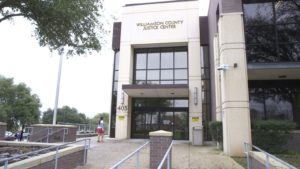The public health emergency caused by COVID-19 has impacted daily life across the country and around the world, including essential government operations like our justice system.
In Williamson County, our justice system responded to the coronavirus through innovation, ingenuity, and a commitment to service.
The courts in Williamson County have long embraced technology, but the disaster declaration accelerated the pace of innovation. On March 13, the Texas Supreme Court and Court of Criminal Appeals ordered that all hearings be held remotely.

In response, judges in Williamson County under the leadership of local Administrative Judges Betsy Lambeth of the 425th District Court and John McMaster, County Court-at-Law Four, activated emergency plans to ensure that the justice system continued to function during the pandemic.
The first step was to identify critical functions including child protection hearings, temporary restraining orders, and protective orders. Probable cause hearings (magistration) that must occur within 24 to 48 hours from the arrest were also identified as critical.
If a probable cause is found, the magistrate determines whether to set a personal bond and orders bond conditions and other statutory conditions. The magistrate also determines if there are any mental health issues and orders an evaluation if necessary.
Next, the judges assembled a team to determine how operations could be modified to achieve their goal. Our judges, clerks, court staff, IT personnel, sheriff, and juvenile services worked together to adjust operational plans and assess technological options to ensure essential functions continued and the public would have access to justice.
Our IT Department provided judges with several options for holding court proceedings: Microsoft Teams, the very popular Zoom, WebEx, and CourtCall.
Court staff created detailed written procedures for hearing participants. Judges and attorneys provided feedback as this process unfolded.
Court-at-Law Judges Doug Arnold (Three), Brandy Hallford (One), and District Judges Stacey Mathews of the 277th Court and Rick Kennon of the 368th Court are determining jury trial procedures for the coming days.
The Office of Court Administration is providing guidance on when these procedures can begin, but that won’t be until after June. The office is also exploring technology options for empaneling juries.
Court-at-Law Two Judge Barker has maintained contact with veterans and defendants in her specialty courts throughout the pandemic.
The level of success that Williamson County has experienced in this transition is a result of a commitment to service. The strong collaboration between IT and the courts means that participants in hearings could be almost anywhere – including jails and juvenile detention facilities.
IT and court staff have spent countless hours at night and on weekends developing and testing solutions. One involved search and arrest warrants that are normally signed in person. Through technology, the district attorney’s office and law enforcement can appear remotely, and the judge can electronically sign the warrant.
Bringing attorneys, litigants and members of the public together required thinking outside the judicial box. Staffs from the sheriff’s office and juvenile services identified spaces in secure facilities where technology could be established to allow in-custody adult and juvenile defendants the ability to participate in hearings.
Many of the in-custody jail call procedures were developed at the direction of 26th District Court Judge Donna King, who ensured individuals in custody had the opportunity to resolve their cases.
Judge Mathews developed procedures for juvenile hearings and is currently developing processes so defendants on bond and without access to technology can attend remote hearings at the courthouse. Another newly developed system to give families without technology access to criminal and juvenile court hearings became available in early May.
Williamson County magistrates were moved to the jury impaneling room in the basement of the courthouse in Georgetown with enough space to distance safely from one another and with access to technology and supplies. This area became the “courtroom,” allowing magistrates to hold hearings with the inmates remotely.
All the innovation and the ingenuity culminated in the first virtual hearing on March 24. On March 26, felony jail call dockets (a court procedure for scheduling hearings, trials, and related matters) along with magistration hearings (held seven days per week) started.
Innovation in our judicial system requires a nimble IT and flexibility for those involved, all while adhering to the rules of judicial conduct and the laws of Texas and the United States. It’s a fine dance, but everyone is encouraged by the successes they have experienced taking a different path.
Despite the ongoing pandemic, justice continues to be served through a human/technology evolution.
 By Terry Cook
By Terry Cook
Williamson County Commissioner










